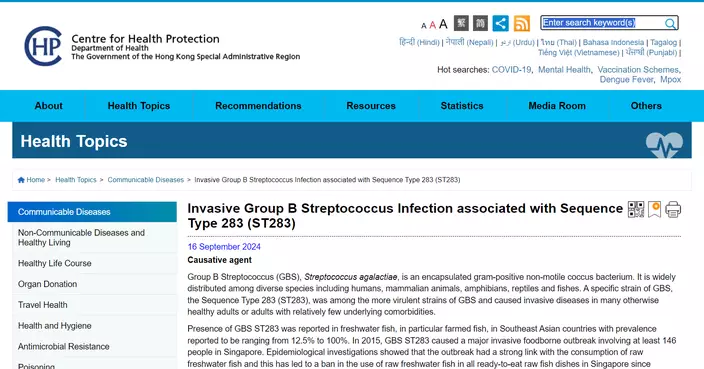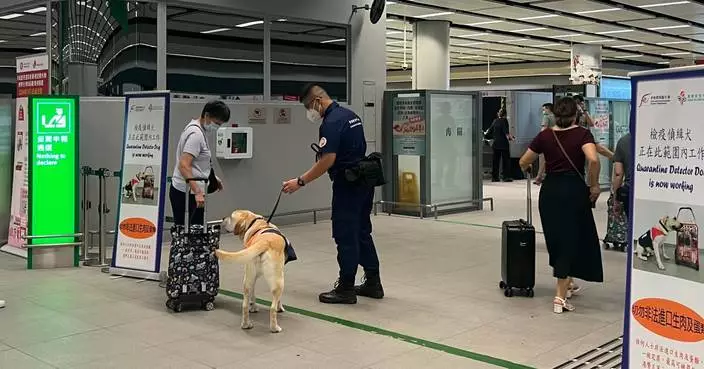August's monthly gravidtrap index for Aedes albopictus mosquitoes drops further
The Food and Environmental Hygiene Department (FEHD) today (September 9) announced that the monthly gravidtrap index for Aedes albopictus mosquitoes in August dropped further to 2.5 per cent from 4.5 per cent in July and was at the lowest Level 1, indicating that the distribution of Aedes albopictus mosquitoes in the areas surveyed was not extensive.
In August, all the 64 survey areas were recorded with a gravidtrap index lower than the alert level of 20 per cent. Moreover, the monthly density index for Aedes albopictus in August was 1.1, which represented that an average of 1.1 Aedes albopictus adults were found in the Aedes-positive gravidtraps, indicating that the number of adult Aedes albopictus was not abundant in the survey areas. The gravidtrap and density indices for Aedes albopictus in different survey areas as well as information on mosquito prevention and control measures are available on the department website at www.fehd.gov.hk.
A spokesman for the FEHD said, "Under the concerted efforts and collaboration of various parties, the index in August dropped further. However, mosquitoes breed quickly during the hot and rainy spring and summer months (i.e. from May to September). Members of the public are reminded to continue the routine mosquito prevention and control work, especially the repair and maintenance of structures. Cracks and dents which may accumulate water and become potential breeding grounds should be filled and levelled to reduce the chance of mosquito breeding.
"In response to the four local cases of dengue fever recorded this year, the FEHD has continued to intensify mosquito prevention and control work with relevant government departments in areas under their purview, including eliminating mosquito breeding places, applying larvicides, conducting fogging operations to eradicate adult mosquitoes, and placing mosquito trapping devices at suitable locations. The FEHD has also provided government departments with professional advice and technical support to assist them in swiftly formulating and implementing effective anti-mosquito measures while strengthening publicity and education at the same time. The FEHD will continue to monitor the mosquito infestation in all districts, and will conduct prompt and effective mosquito prevention and control work," the spokesman added.
The FEHD is conducting a three-phase Anti-mosquito Campaign this year. The third phase of the territory-wide campaign, lasting 12 weeks, was launched on August 5 and will run until October 27. During the period, the district offices of the FEHD will target areas that have drawn particular concern, such as public markets, cooked food centres and hawker bazaars, single-block buildings, streets and back lanes, common parts of buildings, village houses, construction sites, vacant sites and road works sites, to remove accumulated water and carry out mosquito prevention and control work. To further enhance the effectiveness of mosquito control, the FEHD and relevant government departments have carried out the second phase of the All-out Anti-mosquito Operations since May 2 to focus on eliminating potential mosquito breeding places, and called on property management offices to arrange necessary repairs to their premises to minimise mosquito breeding places. Furthermore, intense adult mosquito control has been conducted by means of regular ultra-low volume fogging operations after the onset of the rainy season.
The FEHD appeals to members of the public to work together to carry out mosquito prevention and control measures early, including inspecting their homes and surroundings to remove potential breeding grounds, changing water in vases and scrubbing their inner surfaces, removing water in saucers under potted plants at least once a week, properly disposing of containers such as soft drink cans and lunch boxes, and drilling large holes in unused tyres. The FEHD also advises members of the public and estate management bodies to keep drains free of blockage and level all defective ground surfaces to prevent the accumulation of water. They should also scrub all drains and surface sewers with an alkaline detergent at least once a week to remove any mosquito eggs.
Aedes albopictus is a kind of mosquito that can transmit DF. DF is commonly found in tropical and subtropical regions of the world, and has become endemic in many countries in Southeast Asia. Based on the latest surveillance data from the Centre for Health Protection of the Department of Health, there has been an increase in DF cases in some places in Asia thus far, compared with the corresponding period of last year. The Americas (including Brazil, Argentina and Peru) have recorded over 11 million cases, which is a record number, since the beginning of 2024. The dengue activity in neighbouring areas is high and Hong Kong has recorded 54 imported DF cases and four local DF cases so far this year. Members of the public should continue to carry out effective mosquito prevention and control measures proactively.

Source: AI-generated images









